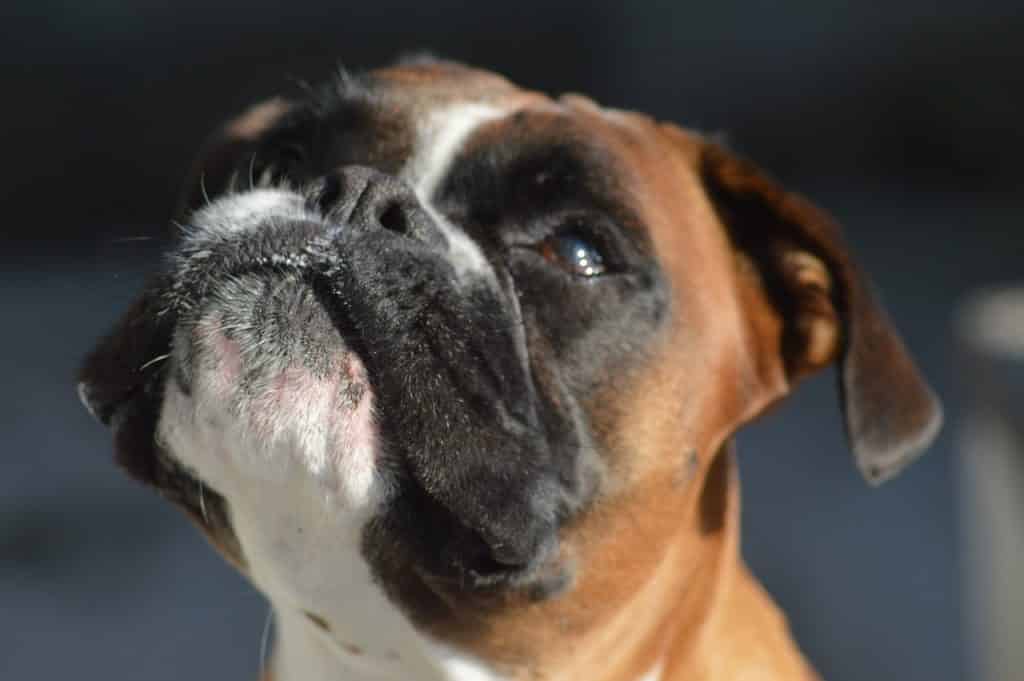The Boxer dog breed has a rich history that spans several centuries. Its origins can be traced back to the Bullenbeisser dogs of 19th-century Germany. These dogs were strong, agile, and excellent hunters, making them popular among German nobility for their guarding and protection abilities. With time, the Boxer breed emerged as a distinct breed, primarily through dedicated breeders’ efforts to refine their working characteristics while preserving their strength and athleticism.
Boxer Dog Breed Characteristics
Boxers are known for their distinctive physical features and lively personalities. They are medium-sized dogs with a strong and muscular build. Their broad, flat skulls and pronounced cheekbones give them a unique appearance. Boxers have a short, smooth coat that comes in various colors, including fawn and brindle.
In terms of temperament, Boxers are renowned for their playful and energetic nature. They exude a natural exuberance and enthusiasm, making them excellent family pets. They are known to be friendly and patient, particularly with children, and they often form strong bonds with their human companions.
Additionally, Boxers are intelligent and eager to please, which makes them highly trainable. However, they can be strong-willed at times, requiring consistent and firm yet gentle handling. Overall, Boxers are a breed characterized by their loyalty, courage, and zest for life. So let’s delve deeper into the fascinating history of these remarkable dogs.
Physical Appearance and Characteristics:
The Boxer is a medium-sized breed known for its strong and muscular physique. They typically have a square-shaped head with a well-defined jawline, giving them a distinctive and alert expression. Boxers have a broad and deep chest, which is a key characteristic of their athletic build. Their short coat is smooth and shiny, and they come in various colors, including brindle, fawn, and white. Boxers have a docked tail, which adds to their overall balanced appearance.
 Aside from their striking physical traits, Boxers are also known for their energetic and playful personality. They are highly intelligent and loyal, making them excellent companions. Boxers have an instinct to protect their family, which makes them great guard dogs.
Aside from their striking physical traits, Boxers are also known for their energetic and playful personality. They are highly intelligent and loyal, making them excellent companions. Boxers have an instinct to protect their family, which makes them great guard dogs.
Despite their powerful physique, Boxers are also gentle and patient with children, making them wonderful family pets. With their playful nature and love for human interaction, Boxers thrive on companionship and enjoy being actively involved in family activities.
Temperament and Personality Traits:
The Boxer dog breed is known for its distinct temperament and personality traits that make it a popular choice among dog lovers. Boxers are renowned for their playful and energetic nature, always ready for a game or activity. They have a great sense of humor and are often described as clownish, bringing joy and laughter to their owners. However, it is important to note that Boxers are also highly intelligent and require mental stimulation in addition to physical exercise. Therefore, Boxer care should include providing them with plenty of toys and puzzles to keep their minds engaged.
In terms of their ideal environment, Boxers thrive in homes with ample space for them to move around and play. They are an active breed that requires daily exercise to maintain their physical fitness. A fenced yard would be ideal, as Boxers have a natural tendency to wander if left unsupervised. Additionally, they are naturally protective of their families and make excellent watchdogs.
Therefore, a Boxer would be happiest in a home with a secure and safe environment, where they can fulfill their natural protective instincts. Maintaining a harmonious environment where they feel loved and cared for is essential to bringing out the best in a Boxer’s temperament and personality.
Health and Common Health Issues:
Boxer dogs, like any other breed, are prone to certain health concerns that owners should be aware of to provide the best care possible. One common health issue that Boxers may face is hip dysplasia, a condition where the hip joints do not develop properly, leading to pain and difficulty in movement. To effectively manage this condition, regular exercise is crucial, but excessive strain should be avoided. Additionally, providing a balanced diet and maintaining a healthy weight can help alleviate the symptoms associated with hip dysplasia.
Another health concern for Boxer dogs is heart disease, particularly aortic stenosis. This condition affects the flow of blood from the heart to the rest of the body, causing fatigue, weakness, and even fainting. Regular veterinary check-ups are essential for early detection and management of heart disease in Boxers. In some cases, medication or surgery may be necessary to improve the dog’s quality of life. However, it’s important to note that not all Boxers will develop these health issues, and with proper care and attention, many can lead long and healthy lives.
Overall, being an ideal human for a Boxer involves understanding and addressing their common health concerns. Early socialization and training go a long way in preventing behavioral problems and managing any potential health issues that may arise.
Boxers thrive in an environment where they feel loved, stimulated, and physically active. Through regular exercise, appropriate nutrition, and regular veterinary care, owners can help ensure their Boxer’s health and well-being for years to come.
Exercise and Activity Need for Boxer Dog:
Boxers are a high-energy breed that requires regular exercise to keep them happy and healthy. Due to their muscular build and active nature, Boxers thrive in environments that provide ample space for them to run and play. Engaging in physical activities is not only essential for their physical well-being but also crucial for their mental stimulation.
 To meet their exercise needs, Boxers should ideally engage in at least an hour of vigorous activity each day. This could include brisk walks, jogging, or playing fetch in a securely fenced yard. Additionally, Boxers excel in various canine sports such as agility, obedience, and tracking. These activities not only help to burn off excess energy but also provide an outlet for their innate intelligence and problem-solving skills.
To meet their exercise needs, Boxers should ideally engage in at least an hour of vigorous activity each day. This could include brisk walks, jogging, or playing fetch in a securely fenced yard. Additionally, Boxers excel in various canine sports such as agility, obedience, and tracking. These activities not only help to burn off excess energy but also provide an outlet for their innate intelligence and problem-solving skills.
Regular exercise not only contributes to Boxer’s physical fitness but also aids in maintaining their overall health. Adequate exercise helps to prevent obesity, a common issue in this breed, which can lead to various health problems.
Furthermore, keeping Boxers active and engaged helps to prevent behavioral issues that may arise from pent-up energy. It is important to note that while exercise is essential for a Boxer’s well-being, it should always be balanced with proper nutrition, grooming, and regular veterinarian check-ups to ensure optimal health and happiness.
Training and Socialization:
Training and socialization are crucial aspects of raising a well-behaved and obedient Boxer dog. Boxers have a history of working and guarding roles, so they possess strong instincts. Understanding their background highlights the importance of training and socializing to shape them into loving family pets.
When welcoming a Boxer dog into the family, it is essential to establish consistent rules and boundaries from an early age. Boxers are intelligent and eager to please, making them highly trainable. They thrive in environments where positive reinforcement techniques are used, such as rewards and praise for desired behaviors.
Socialization is equally vital, as Boxers have a naturally friendly and sociable temperament. Exposing them to various people, animals, and environments early on allows them to develop proper social skills and adaptability, ensuring they become well-rounded companions.
Suitable Living Conditions:
Boxer dogs thrive in a living environment that provides them with ample space and room to move around. Boxers are energetic dogs that need a fenced yard for exercise and play, ensuring their safety and preventing them from wandering off. They do well in houses and apartments if their exercise needs are met, but access to outdoor space is beneficial. Social and affectionate, Boxers need daily walks, playtime, and mental stimulation, along with interaction with their human companions and other pets.
Grooming and Maintenance for Boxer Dog:
Proper grooming and maintenance play a vital role in maintaining the health and hygiene of Boxer dogs. Regular brushing is essential to keep their short coat in optimal condition. Using a soft-bristle brush or a grooming mitt, gently remove any loose fur and ensure a shiny appearance. During shedding seasons, more frequent brushing may be necessary to control the amount of loose hair around the house.
In addition to brushing, it is important to keep Boxer dogs’ nails well-trimmed. Long nails can cause discomfort and even impact their ability to walk properly. Using a dog-specific nail trimmer, carefully clip the nails, taking care not to cut too close to the quick.
If you are unsure about nail trimming, it is advisable to seek professional help from a veterinarian or a certified dog groomer. Furthermore, regular dental care is essential for Boxers to maintain good oral hygiene and prevent dental diseases. Proper dental hygiene can be achieved through regular brushing using a dog-specific toothbrush and toothpaste.
